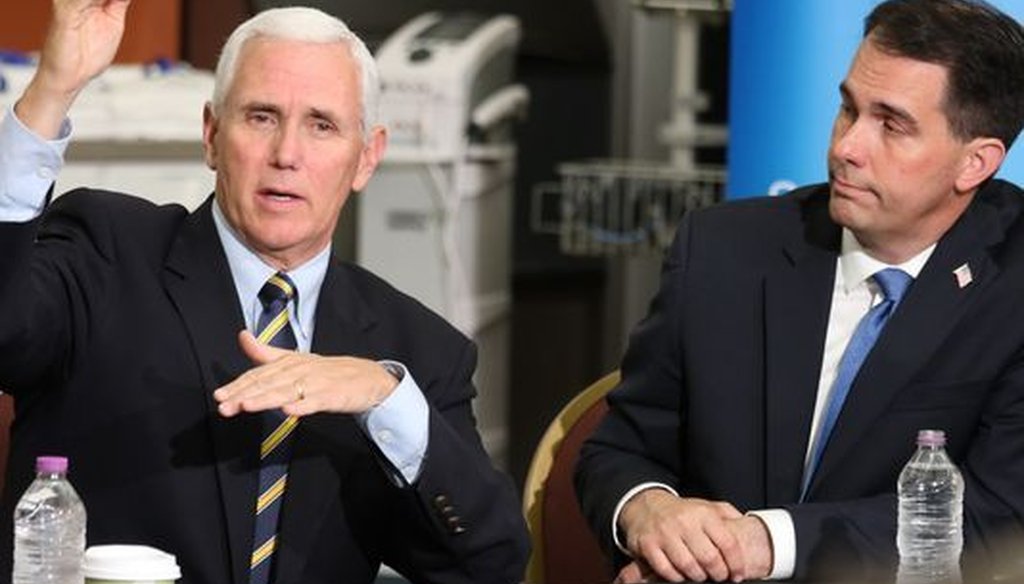Stand up for the facts!
Our only agenda is to publish the truth so you can be an informed participant in democracy.
We need your help.
I would like to contribute

Vice President Mike Pence (left), who was joined by Wisconsin Gov. Scott Walker, appeared in Milwaukee on June 10, 2017. Pence bashed Obamacare and promised that Republicans would deliver a better replacement. (Pat A. Robinson/Milwaukee Journal Sentinel)
In Wisconsin on June 10, 2017, three days before a Badger State visit by President Donald Trump, Vice President Mike Pence repeatedly bashed Obamacare.
And in his speech at a Milwaukee company that helps build and equip long-term care and senior-living communities, Pence pledged:
"We're going to make sure that every American with preexisting conditions has access to the coverage and the care that they need -- no exceptions."
It’s a bold claim, though made in the form of a prediction, so we won’t put it to the test on the Truth-O-Meter.
That said, Pence’s statement is misleading based on the Republican replacement for Obamacare that passed the U.S. House of Representatives, which experts see as making insurance unaffordable for many people with preexisting conditions.
Sign up for PolitiFact texts
So, for his prediction to be correct, changes on preexisting conditions would have to be made in the Senate.
‘Trumpcare’ vs Obamacare
Obamacare, formally known as the Affordable Care Act, prohibits insurance companies from denying coverage — or charging higher premiums — because a person has a preexisting medical condition, such as diabetes or heart disease.
The American Health Care Act, which some Democrats are calling "Trumpcare," is the GOP replacement. Like Obamacare, it says insurers have to provide access to coverage for those with preexisting conditions.
But it doesn’t say anything about not charging them higher premiums.
PolitiFact has covered this in three fact checks.
Fact-checking the House bill
The conservative American Action Network, a group supporting House Speaker Paul Ryan, said in TV ads in Wisconsin and other states that under the American Health Care Act "people with preexisting conditions are protected." PolitiFact Florida’s rating was Mostly False.
Our colleagues found that insurers could charge people significantly more if they had a preexisting condition. And while Republicans point to the fact that those patients could get help through so-called high-risk pools, experts question their effectiveness.
(We rated Half True a claim by Ryan, a key supporter of the GOP bill, that before Obamacare, Wisconsin’s high-risk pool, which he touted as a national model, "had eight or nine" plans to choose from, people "could go to any doctor or any hospital they wanted, and their premiums and co-pays were cheaper than they are under Obamacare today." The Wisconsin Republican slightly overstated the number of plans and the availability of providers, but was generally on target, though it can’t be flatly stated that the high-risk pool plans were cheaper than Obamacare plans for comparable coverage.)
PolitiFact Florida rated Mostly False Trump’s claim that "preexisting conditions are in the bill." In some states, under the House bill, health insurers would be able to charge sicker people more, our colleagues pointed out.
And PolitiFact North Carolina arrived at Mostly False when U.S. Rep. Robert Pittenger, R-N.C., said the GOP plan "absolutely does not eliminate protections for preexisting conditions." Insurers would be able to charge people significantly more if they had a preexisting condition, possibly requiring people to pay thousands of dollars extra every year to remain insured.
Ryan spokesman Ian Martorana emphasized that under the House bill, insurers could charge people with preexisting conditions more only if states obtain a "waiver" from the federal government. And even then, he said, those states would need to provide help through mechanisms such as a high-risk pool. And only people who have a lapse in health coverage could be charged more.
What will the Senate do?
The three fact checks above were all based on the GOP replacement as approved by the House. It’s possible that provisions on preexisting conditions could be altered by the Senate, which could take a vote on a replacement bill before July 4, 2017, although that’s not certain.
Preexisting conditions are certainly part of the debate, with some Republicans opposing a plan that would allow insurers to charge higher rates based on preexisting medical conditions. Trump has promised the plan would "take care of" preexisting conditions.
CNN reported a few days before Pence’s speech that according to Senate GOP aides, Republican leaders don't want to let states allow insurance companies to charge people more based on their medical history. But such a change "could infuriate conservatives in their own ranks and set up a showdown with the House of Representatives, perhaps endangering the entire repeal effort," CNN said.
The day before Pence’s speech, Politico went so far as to say that conservatives were "near revolt on Senate health care negotiations." But that report also said there was general agreement on "tossing away House language that allowed people with preexisting conditions to be charged much more money."
Our Sources
WISN.com, video of Mike Pence speech (17:40), June 10, 2017
Email, Paul Ryan press secretary Ian Martorana, June 13, 2017
PolitiFact Florida, "Under the American Health Care Act ‘people with pre-existing conditions are protected,’" May 24, 2017
PolitiFact Florida, "Does the GOP's new health care bill still cover pre-existing conditions, as Trump claims?" May 1, 2017
PolitiFact North Carolina, "Does new version of the AHCA protect coverage for pre-existing conditions?" May 4, 2017
The Hill, "Divisions emerge in the Senate on pre-existing conditions," May 23, 2017
Politico, "Conservatives near revolt on Senate health care negotiations," June 9, 2017
PolitiFact Wisconsin, "Paul Ryan's claim on Wisconsin being a model for covering people with preexisting conditions," May 19, 2017






















